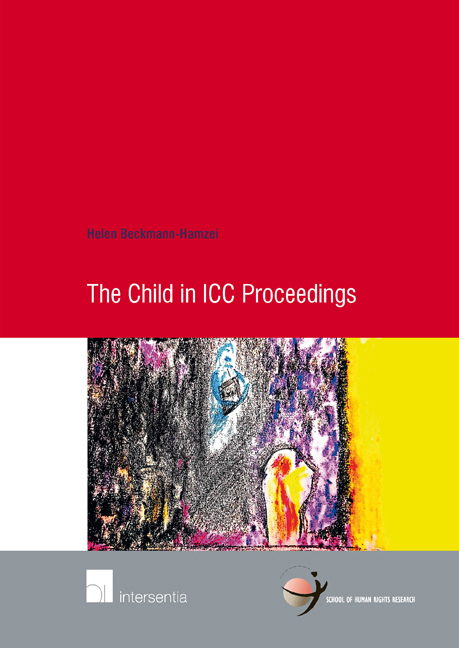Book contents
- Frontmatter
- Acknowledgments
- Contents
- List of Abbreviations
- Introduction
- Part I The Child in International Criminal Proceedings
- Part II The Child in International Reparation Practice
- Part III Concluding and Comparative Evaluation
- Chapter 6 Evaluation and Future Perspectives
- Summary
- Samenvatting
- Selected Bibliography
- Overview of Legislation
- Overview of Cases
- Curriculum Vitae
- Titles Published in the School of Human Rights Research Series
Chapter 6 - Evaluation and Future Perspectives
from Part III - Concluding and Comparative Evaluation
Published online by Cambridge University Press: 12 December 2017
- Frontmatter
- Acknowledgments
- Contents
- List of Abbreviations
- Introduction
- Part I The Child in International Criminal Proceedings
- Part II The Child in International Reparation Practice
- Part III Concluding and Comparative Evaluation
- Chapter 6 Evaluation and Future Perspectives
- Summary
- Samenvatting
- Selected Bibliography
- Overview of Legislation
- Overview of Cases
- Curriculum Vitae
- Titles Published in the School of Human Rights Research Series
Summary
INTRODUCTION
Each of the foregoing chapters draws conclusions as to the child-specific particularities before the ICC pursuing two research aims:
° to analyse whether and to what extent the proceedings are child sensitive;
° to establish whether additional child-specific regulation and awareness is necessary in order to accommodate the particular needs of the child.
It has been established, where necessary, whether additional child-specific regulation and awareness is necessary in order to adequately accommodate the particular needs of the child. The research thereby also assessed whether it is possible at all that ICC proceedings are sufficiently child sensitive. If not, it might be necessary to reconsider the possibility that children participate. Summarising the foregoing, the concrete objective this research focused on has been formulated as follows:
The research aims to provide informed insights into whether participation in ICC proceedings is in the best interests of the child.
When addressing these aims, it has been kept in mind that, even if victims, including children, participate in the proceedings before the Court and claim reparations, I agree with the perspective that the ICC has as its primary objective to ensure a fair trial for alleged perpetrators. Accordingly, throughout the entire research, the punitive nature has been of foremost importance when balancing the best interests of the child against the core objective of international criminal justice. Bearing in mind the objective of the ICC, the fight against impunity, an individual examination of a child (and in particular the individual child's best interests) could be considered to be beyond the capacities of a criminal court whose core task is to safeguard that alleged perpetrators receive a fair trial. One may therefore as such still question the principal relevance of child participation in ICC proceedings.
- Type
- Chapter
- Information
- The Child in ICC Proceedings , pp. 203 - 222Publisher: IntersentiaPrint publication year: 2015

